How Do Employees Act When Faced With Unethical Company Behavior?

How Do Employees Act When Faced With Unethical Company Behavior?
Most employees will not accept a job with a higher salary from an employer that fails to act against sexual harassment. The Manifest surveyed 540 full-time employees to determine how employees act when faced with unethical company behavior. Employees are least tolerant of company behavior that negatively impacts them or coworkers directly, and employees are most likely to protest privately about any disagreeable behavior.
A company’s ethics directly impact its relationship with employees. Historically, companies used ethics and compliance programs to satisfy legal and regulatory expectations, but today’s employees demand more from employers.
According to Ethics.org, 30% of American employees have witnessed a rules violation at work.
Work consumes increasingly more time in workers’ lives. Employees demand honesty and integrity from the companies that take up so much of their time. A company’s ethics impact its ability to mitigate risk from within and hire, promote, and retain the best talent.
The Manifest surveyed 540 full-time employees at companies ranging from small businesses to large enterprises.
Our research finds that most employees will not accept a job with a higher salary from companies that fail to act against sexual harassment. Upon discovering a company’s misbehavior, most employees take action by privately protesting to a manager or supervisor.
Businesses can use this report to learn which company behaviors employees consider intolerable, how employees react to companies’ misbehavior, and how to create organizational structures that prevent issues in the future.
Our Findings
- More than three-quarters of employees (79%) will not accept a job with a higher salary from a company that failed to act against employees who were involved in sexual harassment.
- Company behavior that employees find intolerable when considering a raise also includes selling or using customer data without consent (76%), creating environmental problems (72%), and paying female and minority employees less than others (71%).
- When employees decide whether to accept a raise, they are most likely to tolerate companies that give political donations to candidates they personally dislike (54%).
- Employees who observe company behavior they disagree with are most likely to protest privately (35%), resign (17%), or do nothing (16%).
- Employees are most likely to approach a superior when they’ve observed the company fail to act against sexual harassment (43%), pay minority workers less than non-minorities (40%), create environmental problems (39%), and collect sensitive data about customers (34%).
Employees Are Least Tolerant of Sexual Harassment in the Workplace
Sexual harassment in the workplace is top of mind since the emergence of the #MeToo movement.
Employees are least likely (79%) to accept a job with a higher salary from an employer that fails to act against sexual harassment.

By comparison, employees are more likely to tolerate other disagreeable behaviors for a pay increase, such as a company paying minority employees less than non-minority employees (71%), using a legal loophole to minimize tax liability (61%), or making political donations to candidates they dislike (46%).
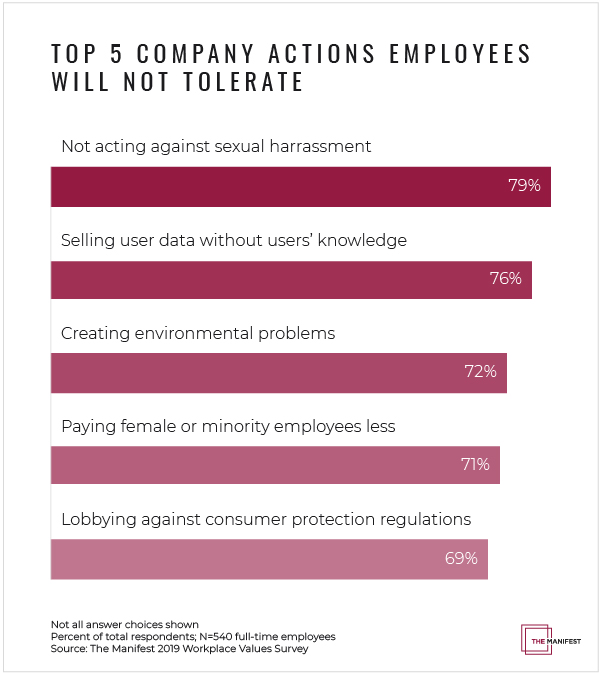
Companies must foster a safe and supportive work environment for all employees. Despite the social progress made in recent years, preventing sexual harassment in the workplace remains a real challenge for businesses.
According to the nonprofit Stop Street Harassment, 38% of women report having experienced sexual harassment in the workplace. Of those surveyed, 13% of men reported having been sexually harassed – mostly those within socially marginalized groups.
A hostile work environment leads to an unproductive workforce and increased turnover. It also degrades the company’s reputation. For businesses, repairing this damage takes considerable time and money. For victims, the damages of sexual harassment are more insidious such as changing their routine or even quitting their jobs
Victims of sexual harassment are likely to feel anxious or depressed (31%), change their route or regular routine (23%), and end a relationship (15%), according to Stop Street Harassment.
Legal claims of sexual harassment cost companies almost $165 million in 2015 alone, according to the Equal Employment Opportunity Commission (EOCC).
Given the high cost and low accountability of sexual harassment within businesses, it’s unsurprising that many transgressions go unreported. According to the EOCC, 11,200 cases of workplace sexual harassment were reported in 2015. This is only 40% of the projected 28,000 cases in total.
The primary reason to avoid reporting sexual harassment is fear of retaliation, such as firing or a demotion.
One study found that 75% of employees who spoke out against workplace mistreatment faced retaliation. Others were likely to see their feedback swept under the rug by inaction or minimization.
Employees Most Likely to Report Sexual Harassment Privately to Superior
Workers say they’re likely to protest sexual harassment in the workplace privately by reporting incidents to a manager or supervisor. Few say they’d protest publicly.
Nearly half of employees are likely (43%) to confront a superior if they learn that their company failed to act against sexual harassment.
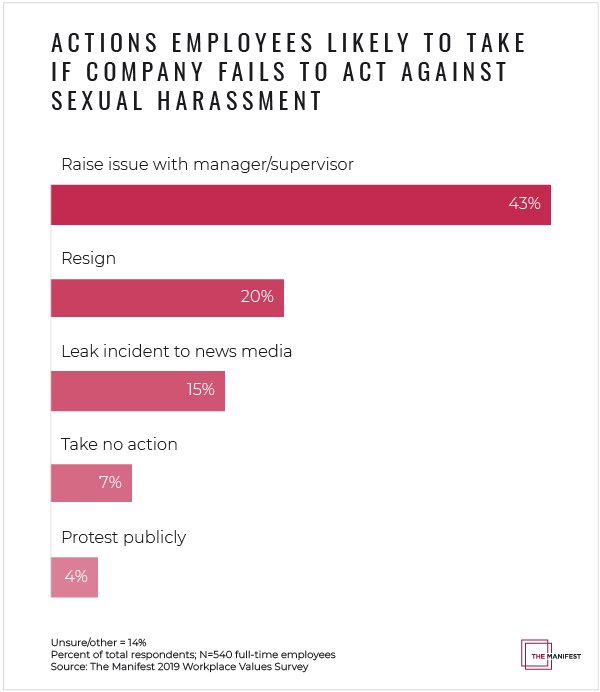
Secondarily, employees are likely to quit (20%), leak the information to the news media (15%), do nothing (7%), or protest publicly (4%).
This data confirms that though some employees feel empowered, many cases of sexual harassment go unreported or are unresolved by higher-ups.
Google’s workforce is one example of how employees can protest sexual harassment publicly.
After sexual misconduct was discovered at Google, employees staged a walkout to demand safe workspaces for all, as seen in the Tweet below.
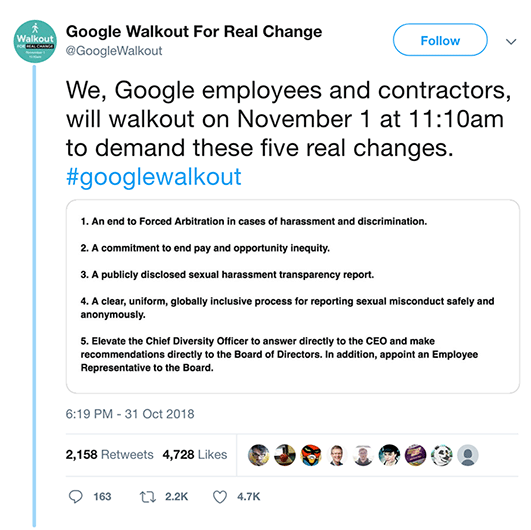
A company culture that expects good behavior is self-reinforcing and protects its members. Google exemplifies a work culture that enables workers to act with confidence and protect one another.
As the #MeToo movement solidifies its place in the public’s consciousness, companies will find it increasingly hard to minimize the consequences of sexual harassment in the workplace.
Employers must address sexual harassment or face blowback from employees that can increase turnover, diminish profits, and damage the company’s reputation.
Majority of Employees Won’t Accept Job With Higher Pay From Company That Creates Environmental Problems
Environmental issues that stem from work weigh heavily on employees. Nearly 75% of employees will not accept a raise from a company that creates environmental problems.

People want their work to have integrity and feel strongly that their company shouldn’t degrade the environment.
As the work-life barrier becomes more porous, employees seek jobs that help them feel ethically sound. Nearly three-quarters (74%) of employees surveyed by Cone Communications, a public relations and marketing agency, said their job is more fulfilling when they have the opportunity to make a positive environmental impact, and 70% would be more loyal to a company that helps them make this contribution.
Hence, a company’s social and environmental commitments are key drivers in employee recruitment, retention, and loyalty.
For example, Adobe has ranked in Fortune’s 100 Best Companies list for 18 years running and also earned the title of Newsweek’s “greenest IT company” four years in a row.
The company's environmental actions include:
- LEED certification of 70% of its workspaces
- Energy production via solar panels
- Reduction in water usage by 60% during California's recent historic drought
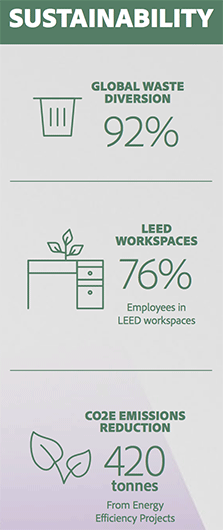
These green initiatives help to attract quality talent that cares about the impact of their work.
“As employees integrate their work and personal lives, they see coming to the office as much more than collecting a paycheck,” said Alison DaSilva, executive vice president of corporate responsibility research and insights at Cone Communications.
“They are not limiting their social consciousness to after work hours and want their employers to give them opportunities to make a meaningful difference, whether that’s providing a platform for supporting personal issues or being an active participant in their company’s corporate responsibility efforts,” Silva said.
Companies can demonstrate their commitment to environmental issues while encouraging employee participation in various ways:
- Use hybrid vehicles for company needs
- Install LED lights to save on energy costs
- Incentivize commuting via bike, public transport, or carpools with a commuter savings program
- Install solar panels (and deduct 30% of the cost through the Business Energy Investment Tax Credit)
- Practice green procurement to ensure supplies have zero environmental impact
- Eliminate single-use plastics by switching to refillable pens in the office
- Allow employees to work from home to minimize the impact of commuting
- Stage volunteer efforts to clean up the local environment, such as urban or trail cleanups
Employers must demonstrate their corporate responsibility and instill a sense of purpose, community, and loyalty into their work culture.
Employees Most Tolerant of Political Differences in Companies Offering Them a Raise
Despite the recent surge in political polarization, employees are mostly tolerant of political differences between employers and them.
Our research shows that 54% of employees will accept a raise from an employer who makes political donations to candidates they dislike.
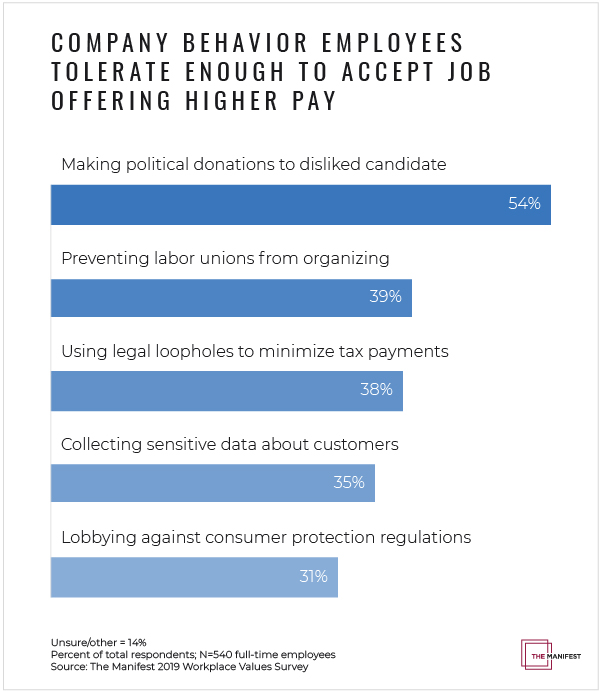
The second most tolerable company behavior is trying to stop labor unions from organizing (39%), using legal loopholes to minimize tax liabilities (38%), collecting sensitive data about customers (35%), and lobbying against consumer protection regulations (31%).
Employees are most likely to tolerate a company’s disagreeable behavior if it’s legally protected, business-oriented, and doesn’t personally impact themselves or coworkers.
“People don’t want their workplaces to be immoral, but most employees need the job more than they need to make a protest,” said Nate Masterson, CEO of Maple Holistics, a natural hair and skin care brand.
Employees are tolerant of differing political actions as long as they don’t negatively impact their contemporaries or them.
When companies work within the legal structures, employees are more likely to tolerate a different viewpoint. But if company behaviors are felt individually, employees are less likely to tolerate disagreeable behaviors.
Employees Most Frequently Protest Privately About Disagreeable Company Behaviors
Regardless of the behavior in question, most employees think it’s up to them to discuss issues directly with an employer.
The most common action employees take when companies misbehave is to protest privately to management (35%).
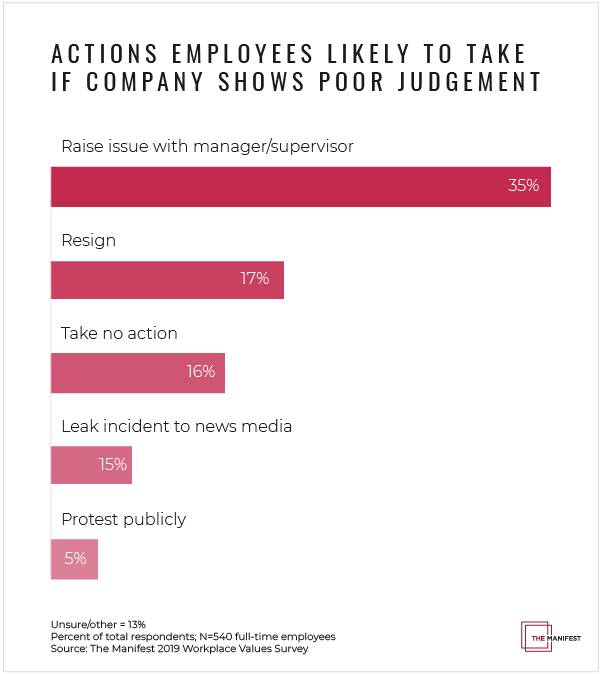
Secondly, employees say they would resign or quit (17%) or do nothing (16%) in the face of company misbehavior.
When the company’s behavior directly impacts them, coworkers, or contemporaries in a negative way, employees feel they should report the misbehavior.
Employees are most likely to approach a superior when they’ve observed that the company failed to act against sexual harassment (43%), paid minority workers less than non-minorities (40%), created environmental problems (39%), or collected sensitive data about customers (34%).
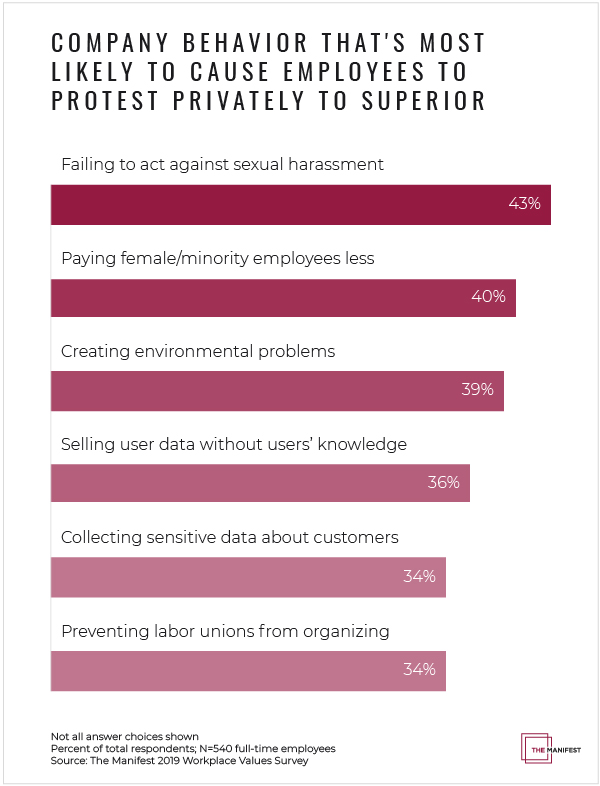
Employees are far less likely to respond to company misbehaviors that are political or structural in nature, such as situations involving differing political opinions or tax evasion.
This suggests that workers feel a sense of responsibility when company misbehavior affects their immediate community. Workers may not have the same urgency to act toward larger issues on their own, though.
Employees are more likely to report behavior if they perceive their actions will create change. When a serious issue is met with disregard from leadership, employees will often escalate the situation by appealing to a regulatory or legal body, if available.
Bringing an internal issue to the attention of a third party makes a concerned worker into a whistleblower. This is undesirable for both workers and employers.
According to the Ethics Resource Center, employees turn into whistleblowers when:
- The problem is ongoing
- Keeping quiet would cause harm to people
- It is perceived as a “big-enough crime”
- The company didn’t do anything about the internal report
- Keeping quiet would get them in trouble
When an employee blows the whistle, the company’s reputation suffers; it incurs legal costs, and it may lose a valuable employee. It’s better for companies to avoid this scenario by encouraging employees to disclose unwanted behavior via internal channels with full protection.
Companies can discourage employees from whistleblowing by:
- Providing a third-party hotline that reports to leadership
- Conduct training for managers that helps them support employees without escalating
- Referring employees to a supportive compliance department
Internal resources like these provide employees with more sustainable options than external reporting.
“If an organization wants to uphold their ethical values, they probably have some resources such as a hotline or some sort of mentorship in place – some way for employees to seek more information or find confidential consolation before they take action, quit the firm, or something more drastic,” said Jane Cote, Academic Director and Associate Professor at Washington State University.
Companies that foster a dialogue around ethics will mitigate risk, strengthen employee relations, and promote a robust work culture.
Employees Are Acting Against Unethical Company Behaviors
Employees are largely intolerant of company behavior that personally impacts coworkers or them.
Workers are least likely to accept a raise from a company that accommodates sexual harassment, pays minority workers less, creates environmental issues, or collects sensitive customer data without consent.
Workers are more tolerant of company behavior that only indirectly impacts them. Employees are most likely to accept a raise from a company that makes political donations to a candidate they dislike, tries to stop labor unions from organizing, or uses a legal loophole to avoid a tax liability.
Ultimately, employees value ethics in the workplace but weigh social and environmental concerns more heavily than economic.
About This Survey
The Manifest surveyed 540 full-time employees in the U.S. from businesses of all sizes.
Respondents were split nearly evenly across millennials aged 18 to 34 (42%) and Generation X aged 35 to 54 (43%). Only 14% of respondents were baby boomers aged 55+.
Nearly two-thirds of respondents (61%) were associates or managers at their companies.
Females represented 60% of respondents.
